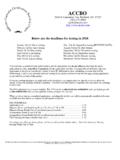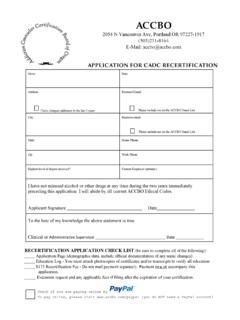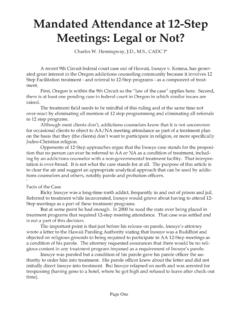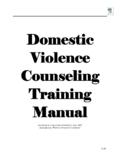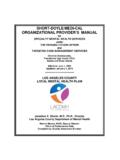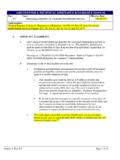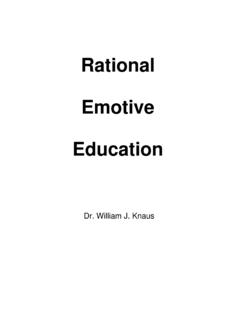Transcription of Addiction Counselor Certification Board of Oregon
1 Addiction Counselor Certification Board of Oregon Ethics Commission Policy & Procedures POLICY ONE: COMPLAINT PROCEDURES PEER COMPLAINTS a) Should a professional Counselor or other professional request to file a complaint, they shall be asked to write a letter explaining the nature of the complaint and violation believed to have been committed by a Counselor . They should include the offending counselors full name, if known, and their place of employment. b) Complaints will be date stamped and presented to the Ethics Committee upon their next scheduled session SELF REFERRAL a) Should a certified Counselor request to self report potential ethical violations, an ACCBO Ethics Complaint Form shall be delivered to the requesting individual to complete and submit to the ACCBO Ethics Committee. Should a certified Counselor request to self-report potential ethical violations, the Counselor shall be asked to write a letter explaining the nature of the violation and submit it to the ACCBO Ethics Committee.
2 B) Complaints will be date stamped and presented to the Ethics Committee upon their next scheduled session. COMMUNITY COMPLAINTS a) Should a nonprofessional community member or AODA service consumer request to file a complaint, the individual will be asked to submit their complaint in the form of a written letter to the ACCBO Ethics Committee. Should an individual prefer to submit their complaint verbally, a taped oral interview can be scheduled and will be accepted by the ACCBO Ethics Committee. b) Should translation services, handicap services, etc. be required in order to make the complaint, the committee shall make every reasonable effort to accommodate special needs. c) Complaints will be date stamped and presented to the Ethics Committee upon their next scheduled session. POLICY TWO: INVESTIGATION & DATA GATHERING WRITTEN NOTIFICATION TO THE Counselor a) Upon receipt of an ethics complaint and review by the Ethics Committee, notification of the complaint and the "nature of the complaint" will be mailed to the certified Counselor .
3 The Counselor will be given a maximum of 30 days to respond in writing to the ACCBO Ethics Committee. Responses will be date stamped and presented to the Ethics Committee upon their next scheduled session. The Ethics Committee will review the certified Counselor s response to the allegation(s) and make a decision in regards to any need for additional information. In order to maintain the integrity of the data gathering process the Ethics Committee will use discretion in disclosing any information to all parties involved in order to elicit sound information that has not been altered or corrupted by overdisclosure or fear of disclosure. Therefore, only the essential data will be presented to involved parties and at least initially names of complaining community members, peers, clients, etc. will be withheld in order to maintain the validity of the data gathering process. COOPERATION All certified counselors have signed/dated and agreed to the following as a prerequisite to Certification : PRINCIPLE 12: Societal Obligations PART II I am dedicated to hereby pledge my adherence to the standards, ethics and practices of ACCBO.
4 I understand that, if at any time in the future my conduct indicates that I have failed to adhere to the standards, ethics and practices of ACCBO, my right to use the title of CADC can be either suspended or revoked, in accordance with the procedures outlined in the ACCBO Manual, by the Addiction Counselor Certification Board of Oregon . PRINCIPLE 10: Interprofessional Relationships SECTION b The alcoholism and drug abuse Counselor shall cooperate with duly constituted professional ethics committees and promptly supply necessary information unless constrained by the demands of confidentiality. The ACCBO Ethics Committee requires that all certified counselors respond to complaints in a timely manner. The ACCBO Ethics Committee meets on a monthly basis. The standard time allowance for a certified Counselor to respond to a complaint is 30 days or less based upon the date of the next meeting of the Committee.
5 Certified counselors will be afforded a minimum of two weeks to respond to a complaint. OTHER DATA GATHERING a) Should a case require additional data gathering beyond the substance offered by the certified Counselor and the original complaint(s), the committee shall approach other involved parties and elicit their observations, or to set up recorded interviews with the certified Counselor and/or the complaining party(ies). The Ethics Committee will initially pursue consent from either the certified Counselor or complaining party(ies), however the Committee reserves the right to make its own determination of necessary data collection and needed consent of the certified Counselor or complaining party(ies). In order to maintain the integrity of the data gathering process the Ethics Committee will use discretion in disclosing any information to all parties involved in order to elicit sound information that has not been altered or corrupted by overdisclosure or fear of disclosure.
6 Therefore, only the essential data will be presented to involved parties and at least initially names of complaining community members, peers, clients, etc. will be withheld in order to maintain the validity of the data gathering process. b) Other forms of data gathering may include reports of sanctions by other professional organizations, public records of criminal activity, investigations by the Addiction & Mental Health Division, Oregon Health Authority, licensing boards, etc. POLICY THREE: PROCESSING COMPLAINTS DEFINING ETHICAL VIOLATIONS a) The Ethics Committee will identify the problem or dilemma and gather as much information as possible that sheds light on the situation, and clarify whether the conflict is ethical, legal or moral or a combination of any or all these. The Ethics Committee will look at the defined problem from many perspectives to avoid simplistic solutions.
7 The Ethics Committee will not look for "right or wrong" answers but accept the challenge to deal with ambiguity. b) The Ethics Committee will identify the potential issues involved pertinent to the Ethical Standards and contemporary practice guidelines in the field of addictions counseling. After the information is collected, the Ethics Committee will list and describe the critical issues and discard the irrelevant ones. The Ethics Committee will evaluate the rights, responsibilities and welfare of all of those who are affected by the situation and will accept the process of making ethical decisions by identifying competing principles. c) The Ethics Committee will review the relevant ethical guidelines. The Ethics Committee will ask whether agency or professional guidelines or ethical standards offer a possible solution to the problem. The Committee will consider whether its values and ethics are consistent with or conflict with the relevant guidelines, and whether there is a rationale to support the committee's position.
8 INAPPROPRIATE COMPLAINTS a) In cases where the complaint is found to be inappropriate ( ; the Counselor is not certified through ACCBO, the complaint is against an agency versus a certified Counselor , or is in regards to employment practices, etc.), notification will be sent to the complaining party(ies) with a recommendation for grieving to another organization. The ACCBO Ethics Committee shall make every reasonable effort to identify the appropriate resource and refer the complaining party to that particular organization, credentialing or licensing body. CONSULTATION a) The Ethics Committee may obtain consultation. We may consult with an appropriate colleague or colleagues that may have a special expertise in a particular issue to obtain a different perspective on the problem. Consultation can help us think about information or circumstances that we may have overlooked. We will justify our course of action based on sound reasoning.
9 Consultation with colleagues will provide us with an opportunity to test the rationale of our recommended disposition of the case. All consultation will be done while maintaining confidentiality of the unresolved case and protecting the rights of all parties concerned. DISPOSITION a) The Ethics Committee will consider possible and probable courses of action. We may consider different possibilities for action and their potential effects on the client, for others related to the client, and for the constituency of counselors, community members or allied health professionals. b) The Ethics Committee will decide the best course of action, and present its recommendations to the Board of directors. A process of anonymous decision making will be implemented with the Board of directors, in order to protect the confidential nature of the ethics proceedings. The Ethics Committee will resolve cases in 12 months or less.
10 C) Written notice of the disposition of the case will be mailed to the Counselor . Any subsequent sanctions or alterations in Certification status will immediately go into effect. All sanctions affecting Certification status are a matter of public knowledge. Unresolved or unfounded allegations are not public knowledge. Therefore, any individual may contact ACCBO to verify the current Certification status of any individual. ETHICAL STANDARDS OF ALCOHOLISM AND DRUG ABUSE COUNSELORS The Addiction Counselor Certification Board of Oregon is comprised of professional alcoholism and drug abuse counselors who, as responsible health care professionals, believe in the dignity and worth of human beings. In the practice of their profession they assert that the ethical principles of autonomy, beneficence and justice must guide their professional conduct. As professionals dedicated to the treatment of alcohol and drug dependent clients and their families, they believe that they can effectively treat its individual and familial manifestations.
